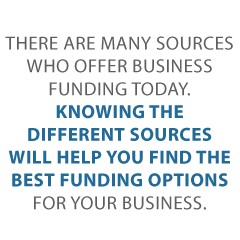Looking For Business Funding Sources?
Isn’t everyone? There are many sources who offer business funding today. Knowing the different sources will help you find the best funding options for your business. Business funding sources are out there.
Remember, most of these funding sources you can access right through your funding suite with us. So reach out to me to receive more information about the specific funding that will work for you and your business.
In the meantime take a look at some of the many sources of funding that are available today.
Business Funding From Business Charge and Credit Cards
Business charge and credit cards are a fast and easy way to access cash for business. You can use the money for any purpose, and you can be approved for business credit with no personal guaranty or credit check. Many merchants will approve you for individual credit cards of $10,000 or higher.
A Look At Angel Investors
Angel investors have been responsible for funding over 30,000 small businesses each and every year. With over 250,000 active angels in the country you may want to consider an angel investor network to simplify your search. These investors are a great source of funding when banks won’t approve you, and perfect for projects where you need a lot of money.
What About Asset Based Funding?
Asset Based Funding is perfect if your company has collateral such as accounts receivable, inventory, equipment, purchase orders, or real estate. These assets can be used to secure the financing you need, and you can secure asset based funding even if your credit isn’t very good.
Business Funding From Bank Loans
Bank loans are still available, although they have become harder to get approved for. Many large banks tend to be much more conservative in lending so you may want to consider a community bank or credit union for a small business loan.
Equipment Leasing
Equipment Leasing helps when you want to lease expensive equipment, and some equipment leasing and financing also works for you to borrower against existing equipment you already own.
What About Factoring?
Factoring is perfect if you have high amounts of account receivables. You can obtain funding up to 25 million and you can receive your advance within 24-48 hours in most cases. With factoring, you sell your company’s accounts receivables to a company (known as a factor) at a discount, in order to free up your cash. The company that purchases the receivables then assumes the responsibility for collecting them. This is a great option as they absolutely don’t care about your own personal credit.
How About Grants?
Grants are a great way to get money for your business, especially government grants. Depending on your business types and intended use of funds, there are many options available for you to receive grant money that doesn’t need to be paid back.
Can Lines of Credit Work for Business Funding?
Lines of Credit are perfect sources of working capital. A line of credit works like a revolving credit card but with much lower interest rates and higher available credit limits. You can get credit lines over $150,000 and write checks from the account or use a debit card to withdrawal funds or use for purchases.
Business Funding Sources Include Merchant Cash Advances and Merchant Lines of Credit
Merchant cash advances and merchant lines of credit are perfect for businesses who process credit card payments. This type of financing will advance you money against future credit card transactions. You can even get a debit card to use the funds you secure.
Business Funding Sources Like Our Credit Line Hybrid
You can also get cash out from our hybrid credit line. Contact us today to find out more about this unique and unsecured type of financing.
What Is Microfinance?
Microfinance loans are less difficult and time intensive to qualify for. There are loan amounts ranging from $500 to $35,000. Many businesses use several micro loans to get money for their business. So this is versus applying for one larger loan due to the easier qualifying criteria.
How About Loans Backed by the SBA?
SBA backed loans are still one of the most popular financing options available today. SBA backs, or insures about 80% of the loan. At the same time, the lender lending the money takes on about 20% or so of the risk. Due to the lower risk to the bank, many major banks are more apt to lend money using SBA backed loans than regular loans.
Venture Capital
Venture capital is neither easy nor fast to be able to tap into. But it can be a viable source of funding. This is a great source when you need higher loan amounts. And it’s great if you don’t mind giving up a potential stake in your company. Plus you don’t have some of the headaches that come with conventional funding. But keep in mind, VCs are only looking for game-changing businesses and concepts. A standard corner dry cleaner isn’t going to be on their radar unless it has a truly unique way of doing things.
Business Funding Sources Are Better with Business Credit
Of course business credit is a terrific form of business funding. Company credit is credit in a business’s name. It doesn’t link to an entrepreneur’s personal credit, not even when the owner is a sole proprietor and the only employee of the company.
Therefore, an entrepreneur’s business and personal credit scores can be very different.
The Benefits
Given that business credit is separate from consumer, it helps to protect a business owner’s personal assets, in case of court action or business insolvency.
Also, with two separate credit scores, a small business owner can get two separate cards from the same merchant. This effectively doubles purchasing power.
Another advantage is that even start-ups can do this. Visiting a bank for a business loan can be a formula for frustration. But building business credit, when done correctly, is a plan for success.
Personal credit scores depend upon payments but also other considerations like credit use percentages.
But for small business credit, the scores really only hinge on if a small business pays its bills promptly.
Business Fundability
Growing company credit is a process. A company needs to be fundable to lending institutions and vendors.
Due to this fact, a business needs a professional-looking web site and email address. And it needs to have site hosting from a company such as GoDaddy.
And, business phone numbers should have a listing on 411. You can do that at ListYourself.
At the same time, the company phone number should be toll-free (800 exchange or the equivalent).
A business also needs a bank account devoted solely to it, and it has to have all of the licenses essential for operation.
Licenses
These licenses all must be in the particular, correct name of the small business. And they need to have the same company address and phone numbers.
So bear in mind, that this means not just state licenses, but possibly also city licenses.
Working with the IRS
Visit the Internal Revenue Service website and get an EIN for the company. They’re free of charge. Pick a business entity like corporation, LLC, etc.
A company may get started as a sole proprietor. But they should switch to a kind of corporation or an LLC.
This is to decrease risk. And it will make the most of tax benefits.
A business entity matters when it comes to tax obligations and liability in case of a lawsuit. A sole proprietorship means the owner is it when it comes to liability and tax obligations. Nobody else is responsible.
The best thing to do is to incorporate.
Setting off the Business Credit Reporting Process
Start at the D&B web site and get a totally free D-U-N-S number. A D-U-N-S number is how D&B gets a business into their system, to produce a PAYDEX score. If there is no D-U-N-S number, then there is no record and no PAYDEX score.
Once in D&B’s system, search Equifax and Experian’s sites for the small business. You can do this at www.creditsuite.com/reports. If there is a record with them, check it for correctness and completeness. If there are no records with them, go to the next step in the process.
In this way, Experian and Equifax have something to report on.
Starter Vendor Credit
First you ought to build tradelines that report. Then you’ll have an established credit profile, and you’ll get a business credit score.
And with an established business credit profile and score you can begin to get credit for numerous purposes, and from all sorts of places.
These kinds of accounts often tend to be for things bought all the time, like marketing materials, shipping boxes, outdoor work wear, ink and toner, and office furniture.
But first off, what is trade credit? These trade lines are credit issuers who give you starter credit when you have none now. Terms are commonly Net 30, rather than revolving.
Hence, if you get approval for $1,000 in vendor credit and use all of it, you need to pay that money back in a set term, such as within 30 days on a Net 30 account.
Vendor Credit – It Helps
To start your business credit profile the proper way, you ought to get approval for vendor accounts that report to the business credit reporting agencies. When that’s done, you can then use the credit.
Then pay back what you used, and the account is on report to Dun & Bradstreet, Experian, or Equifax.
Here are some stellar choices from us: https://www.creditsuite.com/blog/5-vendor-accounts-that-build-your-business-credit/
Accounts That Don’t Report
Non-reporting trade accounts can also be helpful. While you do want trade accounts to report to at least one of the CRAs, a trade account which does not report can still be of some worth.
You can always ask non-reporting accounts for trade references. Additionally, credit accounts of any sort ought to help you to better even out business expenditures, consequently making budgeting simpler.
Monitor Your Business Credit
Know what is happening with your credit. Make sure it is being reported and fix any errors ASAP. Get in the practice of checking credit reports. Dig into the particulars, not just the scores.
We can help you monitor business credit at Experian, Equifax, and D&B for 90% less than it would cost you at the CRAs.
Takeaways for Business Funding Sources and Building Business Credit
Always use credit sensibly! Don’t borrow more than what you can pay back. Track balances and deadlines for repayments. Paying off promptly and in full does more to raise business credit scores than just about anything else.
Establishing business credit pays off. Good business credit scores help a small business get loans. Your lender knows the business can pay its debts. They know the company is bona fide.
The company’s EIN links to high scores and lenders won’t feel the need to ask for a personal guarantee.
Business credit is an asset which can help your business for many years to come. Learn more here and get started toward growing company credit.
Business Funding Sources, On Balance
Every company owner needs business funding. But there are a number of options out there. Go get yours.

